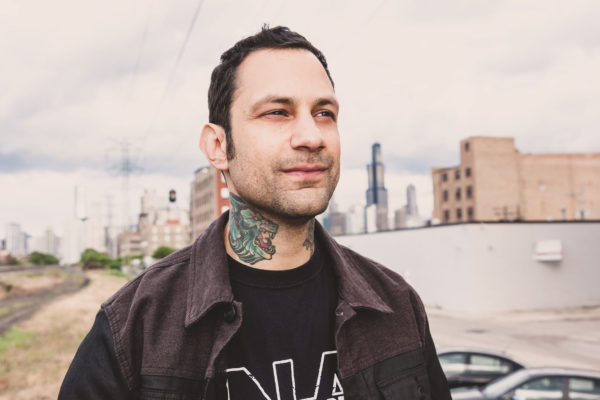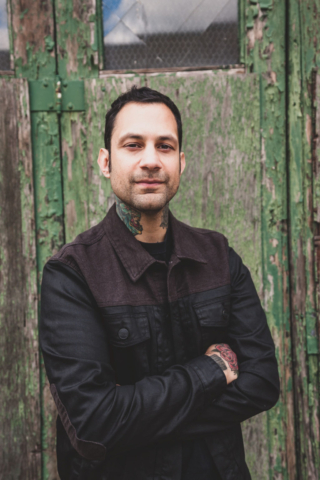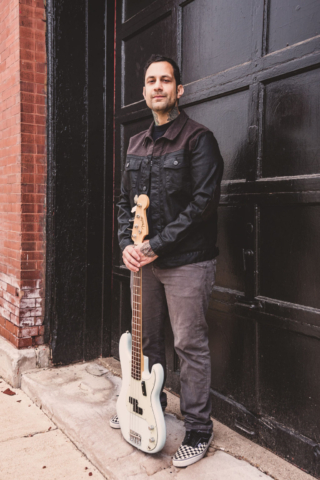
Rise Against released their seventh full-length last month, entitled The Black Market. The album finds the band embracing a rekindled sense of energy, resulting in especially personal lyrics and a range of newfound influences. We spoke with bassist Joe Principe shortly after The Black Market came out and discussed how it was written, its lyrics and its recording process. We also talked about the band’s early days, their continued success, future plans and more.
Bill – Before beginning to write for The Black Market, your band took almost a year off. How did the time away help to shape the making of this album?
Joe – I think it played a huge role in making The Black Market. We’ve been touring basically nonstop for 15 years and we’ve never taken a break for more than three or four months. This time around, we all decided to take a little break, spend time with our families and regroup. As they say, absence makes the heart grow fonder, and it’s true. Because when we came back to Rise Against it was like this renewed excitement and renewed energy. That’s huge in the sound of The Black Market. I think you feel that in just the energetic vibe throughout the whole record.
Bill – Most definitely. I think that’s really evident when you listen to the record. You guys rehearsed and demoed the songs in several different cities and recording studios. Why did you choose this kind of approach and what was that experience like?
Joe – We wanted to jump around from city to city really for a change of scenery. In the past, we’ve written the majority of each record in Chicago and it makes it a little hard to focus, because obviously Tim, (singer Tim McIlrath) and I have our families here. It’s hard to go back and forth from the family world, getting kids to school and stuff like that, and then jump into a rehearsal room. It’s like polar opposite ends of the spectrum. Going away makes it easier to focus and the change of scenery just makes it interesting.
Bill – That makes sense. Compared to your other records, The Black Market definitely has its own unique style. Did you make a conscious decision to go in a new direction or did it just happen naturally?
Joe – Progressing in general for us has always been a natural occurrence. I think with The Black Market, a lot of it has to do with the time off and the renewed sense of excitement with getting back to it. I think this record in general has very energetic vibes throughout. The excitement we had on The Unraveling and Revolutions per Minute, our first couple records, like any band you’re younger, you’re excited and you can devote more time to those records. That’s how we approached this record. We had a lot of time to sit on song ideas and we were excited to get back to it, and that’s why there are a lot of fast tempo songs on this record. Even the single, “I Don’t Want to Be Here Anymore,” still is on the faster side of the tempo spectrum. That to me has always been an important element of Rise Against, our nod to our punk influences and our punk roots. It’s such a huge part of our lives and who we are as a band. It just shines more on this record.
Bill – That’s awesome. By and large, this record’s lyrics are more introspective than they are political. What would you say is the primary reason for this?
Joe – Looking at it from my perspective, where Tim has written all the lyrics since day one of the band, I think it was the year off and kind of submerging himself in his personal life and family. It was hard to get back to it and almost force the lyrics he’s written in the past. He didn’t want to force anything, he always writes from the heart, and that’s just what he was feeling at the time. He realized he had these expectations put on him to write these overtly political lyrics with very dark overtones, and it was hard for him to get into that headspace. And he wanted to write about that process. That’s what the song “The Black Market” is about. At one point he said to me, “I’m having a hard time wrapping my head around lyrics because I don’t have the same angst towards certain things that I did on Endgame.” I think that was his way of working it out.
Bill – That’s interesting to hear about the process that he went through with writing. “Tragedy + Time” is an uplifting song that deals with perseverance and resolve. What inspired its creation?
Joe – Well, actually with every record we have very loose lyrics that are demoed. I didn’t hear the finished lyrics until I was doing backing vocals with Zach, (guitarist Zach Blair) and Bill Stevenson, (producer). It was kind of like a blow to the gut. Those lyrics are so important. That song, you kind of associate major key songs with happy lyrical content, and although that song is uplifting, obviously it’s referring to suicide and things of that nature. I wasn’t expecting that, but that song is one of my favorites as well. I think the use of that particular music as the vehicle to that particular message, it just made sense. It’s going to capture people’s attention for such an important topic.
Bill – I couldn’t agree more. “The Eco-Terrorist in Me” is one of the fastest and heaviest songs that your band has written. Who came up with the idea for this song and what do you like most about how it turned out?
Joe – That was one of my songs, musically. As Rise Against progresses and as we get older as people, we’re all very careful to not rehash old ideas. We still have that aggression, that sheer aggression in us and in our music. I have the need to write those songs. Throughout the history of the band I’ve always written that style of song. So, I brought that song to rehearsal and I thought maybe it wouldn’t fit, but somehow it ended up fitting and it’s definitely my favorite song. Not because I wrote it, just because it’s so pissed off and it definitely describes in one song what Rise Against has been about for the last 15 years. It’s great that we can do that in 2014 and not have it sound like we’re covering a song.
Bill – You guys once again recorded at the Blasting Room with Bill Stevenson and Jason Livermore. What was different about your experience in the studio this time around?
Joe – I think we all, including Bill and Jason, like I mentioned before, we all had this renewed excitement. And again, that doesn’t mean we didn’t have it for Endgame or Appeal…, but with the time off it gave Bill and Jason extra time as well apart from us bothering them in the studio, (laughs). I think when we started demoing these songs, Bill and Jason realized that we had this energy with these songs that we maybe didn’t have on Endgame. Endgame was just a different type of record and Bill really wanted that energy to shine. Even tracking Tim’s vocals, there are things that are left in there, like the gruffness of his voice is a little more audible, and that was on purpose. We wanted it to have a little more of a raw feel. That was definitely everyone kind of being on the same page and I think that’s why this record came together so easily.
Bill – Absolutely. I think that synergy is noticeable. Tell me about the video for “I Don’t Want to Be Here Anymore” and where its concept came from.
Joe – That concept came from Nico, the director, it was his idea basically. He had a bunch of conversations with Tim on what the song meant. He really wanted to showcase what’s happening in the world and that’s what that song is about, how it’s so overwhelming sometimes that you just kind of want to run away. It came out great. It was really tough because we had to get clearances on the footage we used and it took a long time to get it all straight. Luckily, we have a great manager who got it done, but it was super time-consuming. That video reminds me of our “Prayer of the Refugee” video or “Ready to Fall.” Those videos are important to me because I feel if you’re going to make a music video and you play in a band like Rise Against, you should take advantage of that platform. I think we did just that and I’m really proud of it.
Bill – The Black Market recently debuted at number three in the U.S., and Rise Against is just as popular if not more so in countries like Canada, Australia and Germany. What does it mean to you that your music reaches so many people?
Joe – It just doesn’t feel real. It’s like we’re living a dream. Every record that comes out, it does really well and it still blows me away. We’re incredibly lucky that we can appeal to so many different people and still maintain the sound that we created 15 years ago. That just blows me away. I’ve had a lot of musician friends that have come up to me over the years, their bands are a little bit more mainstream, and they’re like, “How do you guys do it? You kind went through this major label world and you did whatever you wanted to do and no one stopped you guys.” I think it’s the sincerity behind the music that shines through. You can tell on our records that we believe what we’re singing. It’s been a great journey and we’re in it for the long haul, so hopefully we have another seven more records in us.
Bill – In the early days of Rise Against, I remember seeing you guys play in a classroom at DePaul University and at a church in Naperville, IL. Looking back, did you ever envision that the band would achieve this level of success?
Joe – No, not at all. We were in a very strange place because we were sort of melodic and with my association with 88 Fingers Louie and my relationship with Fat Wreck Chords, when Rise Against got on Fat we were a little bit like a fish out of water. Although bands like Good Riddance, Sick of It All and Anti-Flag were on Fat as well around the same time, the East Coast didn’t accept us for a long time. They just were just like, “It’s that guy from 88 Fingers Louie and they did that split with Kid Dynamite that was okay, but whatever. I’m not going to pay attention to Rise Against.” It didn’t really catch on till Siren Song… and it was very label specific as far as popularity goes on the coasts. The West Coast caught on a little bit quicker. We were in a strange spot when we started as a band, but I don’t think we ever envisioned where we are now. It was a struggle for nation-wide success. We just toured so much. We toured with the Mad Caddies and then we toured with Agnostic Front and The Business. Not a lot of bands could do that, but somehow it worked. Slowly but surely it worked. Slow and steady wins the race.
Bill – When you think about Rise Against’s message and the long-term future of the band, what sort of things do you hope to accomplish?
Joe – All I ask is that we continue on the path that we’ve been on for the last 15 years. As long as us four are happy with what we’re doing in the rehearsal room and onstage, then we’re going to continue for as long as there are people there to come see us. That’s one thing, you’re around the same people for so long and you’re always going to have personal differences. You kind of get into an argument and then it’s done in five minutes, like with any friendship. But we’ve always been on the same page musically and that’s huge with the success of the band.











